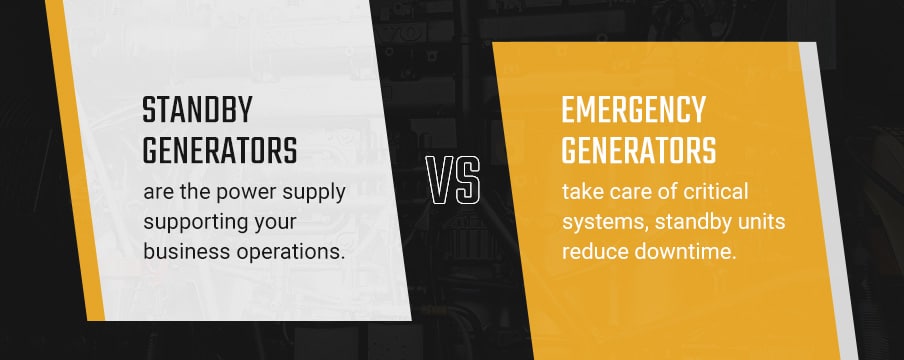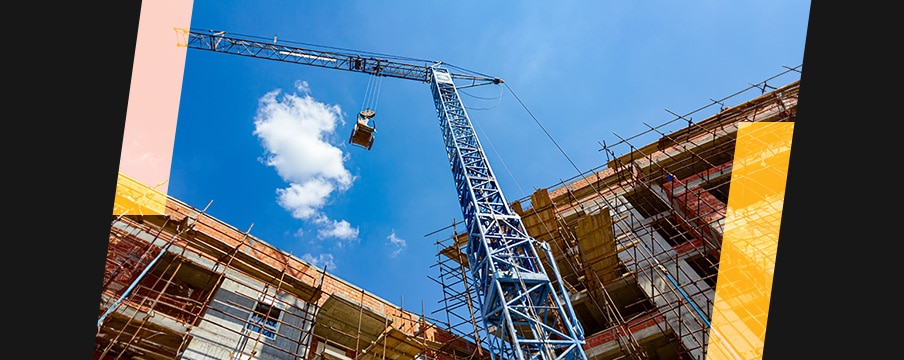Generators for New Construction
Planning new construction means juggling many priorities. Deciding on layout, materials and electrical can make backup power easy to overlook. However, backup support is critical for your new commercial or industrial building. When the power fails, avoid getting caught off-guard. Protect your construction, financials and future occupants when you invest in a quality generator.
Why Is Backup Power for New Commercial Buildings Important?
Backup power is essential for any new commercial construction. It keeps your operation running smoothly during outages. Remember, the National Fire Protection Association (NFPA) recommends or requires emergency power for every commercial building. Compliance is important, but generator benefits go beyond that. Getting a backup generator means enjoying these benefits:
- Reduced downtime: Generators keep your operation up and running. You’ll save money and maintain productivity with less downtime due to outages.
- Safety system support: Emergency safety systems need power to work. A backup source keeps your fire alarms, emergency lighting and security systems working. This will help you stay compliant and protect building occupants during emergencies. Depending on application, a backup generator may be absolutely required in instances where a Level 1 Emergency Power Supply System (EPSS) is needed for life-saving equipment or to prevent loss of life.
- Protected equipment: Backup supplies also prevent equipment damage. A sudden power loss might affect sensitive equipment. Your servers, heating and air conditioning system and manufacturing machinery need protection from sudden power changes. Generators keep essential equipment running, preventing these problems.
Types of Generators for New Commercial Buildings
When getting generators for your new building, the type you choose is important. Backup power needs to meet requirements based on your operation, power use and electrical codes. While you should consider fuel type and size, you can split commercial generators into two main types:
1. Emergency Generator Systems
Emergency generators are essential for protecting occupant safety. There are 2 levels of emergency generator systems. Level 2 emergency power supply systems (EPSS) requirements pertain to less critical situations where lives are not at risk. They kick on during an outage to keep critical systems running. Your emergency lighting, fire alarms and elevators all need emergency support to ensure everyone can exit the building. The law regulates emergency power sources to protect safe egress and emergency responder work. Level 1 emergency power supply systems (EPSS) include everything that may be required in level 2, but also include situations where power failure can result in the loss of human life.

2. Standby Generator Systems
Standby generators are the power supply supporting your business operations. While emergency generators take care of critical systems, standby units reduce downtime. Whether keeping up systems such as POS, server systems, databases, or any standard equipment that is required to continue business operations, a standby generator focuses on less critical safety requirements.
Diesel and natural gas are the two main fuel types for standby generators. Use them to power your ventilation, computers and other equipment that impact your day-to-day operation. Investing in standby models keeps your productivity up during outages for minimal downtime and can mitigate potential productivity loss.
Commercial Generator Requirements
The NFPA sets safety standards for generators and backup power in commercial buildings. Following these codes keeps your business safe during emergencies. NFPA 110 and International Building Code (IBC) Section 2702.1.4 are the main standards for backup power. These resources cover everything you need to know about installation, emergency power and maintenance.
Generators should meet requirements based on the operation type. You can break code requirements down into these general categories:
- Building type: What is your building used for? If failing equipment in your space will cause serious injury or loss of life, you’re a Level 1 building. Otherwise, you’ve got Level 2 power needs.
- Downtime: The IBC and NFPA regulate the delay between an outage and backup power generation. If you’re a Level 1 building, like a hospital, your standby power has 60 seconds to kick on. Emergency support systems should start up within 10 seconds of power loss.
- Maintenance: The NFPA requires regular generator testing and inspection. Generally, you’ll need to perform weekly inspections, monthly exercises and testing every 36 months.
A good power source should meet your needs without sacrificing safety. After meeting basic generator requirements, you’ll need to consider these factors:
- Power requirements: Look at generator wattage. Can the generator rating meet your power needs for critical systems during an outage?
- Maintenance: How challenging is the maintenance? Is the generator easy to access? Can you afford the required upkeep?
- Fuel type: Diesel and natural gas come with unique benefits. Look at cost, local availability and environmental impact. Find a support source that uses the fuel that works best for your operation.
Where to Place Backup Power for Industrial Buildings
Generator placement is essential for safe, effective power delivery. Backup generators are commonly placed outside to avoid numerous safety issues. Place your generator away from the building in a secure space to prevent exhaust from getting inside.
Make sure to avoid pedestrians and restrict access to the generator by pedestrians and combustible materials. Also, consider creating a secure enclosure. Outdoor generators are exposed to wind, snow, rain and environmental hazards. A sound enclosure stops these factors from affecting power supply performance.
When installing a generator outdoors, remember to double-check accessibility. You need easy access to the unit for maintenance and testing. Always consult an installation expert and relevant code requirements to prevent safety hazards and violations. Sticking to the book ensures a safe, functional generator for your commercial operation.
Depending on location and feasibility, some companies choose to create a dedicated generator room, which is a room designated for the generator to be stored, housed, and operated from within the facility. There are many requirements and restrictions required when setting up a dedicated generator room, so be sure to consult with multiple engineers such as building engineers, electrical engineers, civil engineers and certified safety inspectors that can point you in the right direction.
Get Generators for New Commercial Buildings From Woodstock Power Company
When it comes to backup power for your new commercial building, you need a partner you can trust. Woodstock Power understands the importance of reliability and compliance. We offer comprehensive generator solutions tailored to meet your project needs. Our used commercial backup generators ensure you’re code-compliant and protected during an outage. With our industry knowledge, you can trust Woodstock Power to deliver dependable backup power solutions.
Headquartered in Philadelphia, PA, and operating nationwide, we have industry experts who focus on commercial generator sets, with in-depth industry knowledge to help you choose the right generator that fits your needs.
We are industry leaders in buying and selling used generators to fit the needs of many businesses, including commercial, industrial, medical, agricultural and university. This includes facilities like hospitals, better living centers, nursing homes, airports, hotels, resorts, restaurants, retail centers, manufacturing, production and more.
Our experts are ready to assist you, from answering any questions you may have about power generator sets to helping you find the best selection in our inventory based on:
- Peak & Average Power Requirements
- Fuel Preference (Natural Gas or Diesel)
- Portability & Stationary Power
- Prime & Standby Generator Requirements
- Available Space & Exhaust Restrictions
We carry only the most top-rated new, used and surplus power generator sets for sale, providing you with a great-value generator that will fit your budget.
Our generators have been thoroughly inspected, serviced and verified, which ensures that you will be buying a quality generator you can depend on. If a generator is not up to par with industry standards, we make all necessary repairs or modifications, and we fully test every generator before we sell. This ensures a full turnkey generator that’s ready to fire up and go!
Due to our wide selection of generator sets, we’re confident that we can find the model that best suits your operational needs and budget.
We also buy used generators in good quality, if you have already upgraded and you’re looking to sell your older model.
Feel free to contact us with any questions, concerns or inquiries to learn more about the Woodstock Power Company experience and the quality level of products and services we provide.



